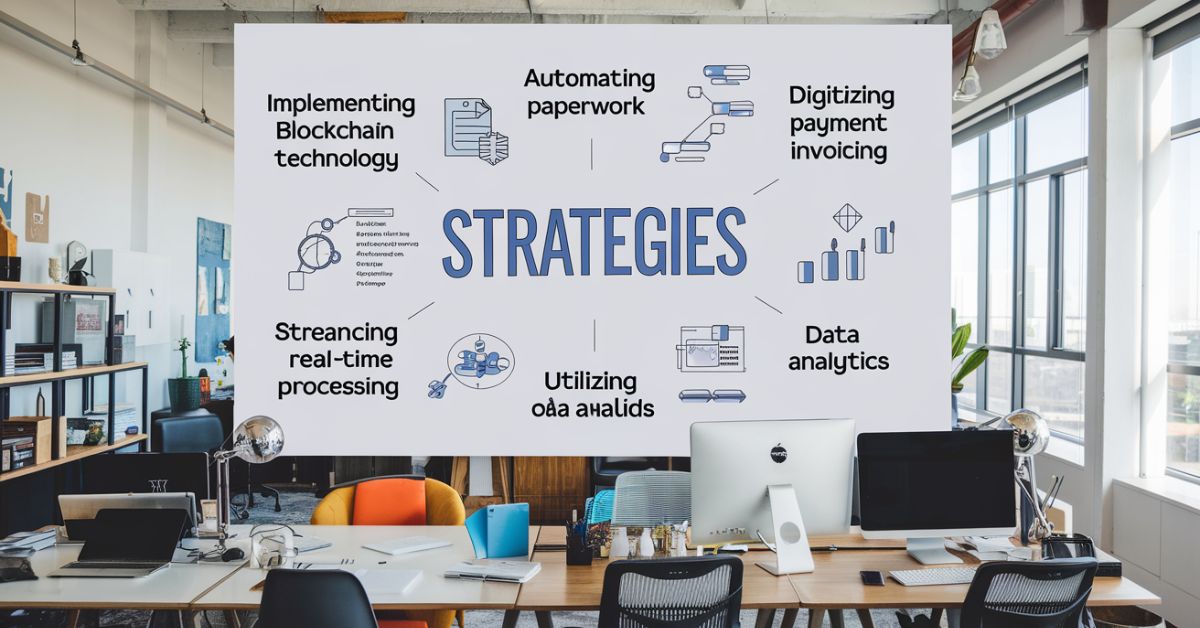In today’s fast-paced global economy, the shipping industry faces unprecedented challenges and opportunities. Fintech startups are at the forefront of revolutionizing this sector, bringing innovative solutions that enhance efficiency, reduce costs, and improve customer satisfaction. This article delves into six key strategies that fintech companies are employing to transform shipping operations, with a focus on how these technologies are reshaping the landscape for businesses in the United States. Six Strategies Fintech Startups Use to Enhance Efficiency in Shipping Operations.
1. Utilize AI-Driven Route Optimization for Cost Efficiency
Artificial Intelligence (AI) is no longer just a buzzword—it’s a game-changer in shipping logistics. Fintech startups are harnessing the power of AI to optimize shipping routes in ways that were previously unimaginable. Six Strategies Fintech Startups Use to Enhance Efficiency in Shipping Operations.
The Power of AI in Shipping Logistics
AI algorithms can process vast amounts of data in real time, considering factors such as:
- Traffic patterns
- Weather conditions
- Port congestion
- Fuel prices
- Historical performance data
By analyzing these variables simultaneously, AI systems can determine the most efficient routes for shipments, leading to significant improvements in delivery times and cost savings. Six Strategies Fintech Startups Use to Enhance Efficiency in Shipping Operations.
Cost Savings Through Intelligent Routing
The impact of AI-driven route optimization on a company’s bottom line can be substantial:
- Fuel Efficiency: Optimized routes can reduce fuel consumption by up to 15%, according to recent industry studies.
- Transit Times: AI can cut transit times by 10-20%, leading to faster deliveries and increased customer satisfaction.
- Resource Allocation: Better route planning allows for more effective use of vehicles and personnel.
Case Study: NaviSmart’s Revolution in Route Planning
NaviSmart, a fintech startup based in San Francisco, has developed an AI-powered platform that’s changing the game for small to medium-sized shipping companies. Their system has helped clients achieve:
- 18% reduction in fuel costs
- 22% improvement in on-time deliveries
- 30% decrease in route planning time
One client, a regional delivery service in the Midwest, reported annual savings of $1.2 million after implementing NaviSmart’s solution.
2. Leverage Data-Driven Planning for Accurate Shipping Estimates
In the age of instant gratification, accurate shipping estimates are no longer a luxury—they’re a necessity. Fintech startups are leveraging big data and advanced analytics to provide unprecedented accuracy in delivery time predictions.
Big Data’s Role in Predictive Analytics
Fintech companies are collecting and analyzing vast amounts of historical shipping data to build sophisticated predictive models. These models take into account:
- Seasonal trends
- Regional variations
- Carrier performance
- Economic indicators
By processing this information through machine learning algorithms, fintech startups can offer shipping estimates that are often accurate to within hours, not days.
Improving Customer Satisfaction with Accurate ETAs
The benefits of precise shipping estimates extend beyond operational efficiency:
- Reduced Uncertainty: Customers appreciate knowing exactly when their packages will arrive.
- Proactive Communication: Accurate ETAs allow for better communication about potential delays.
- Competitive Advantage: Companies that provide reliable estimates often see increased customer loyalty and repeat business.
Tools Fintech Startups Use for Data-Driven Planning
| Tool Type | Function | Example Startup |
|---|---|---|
| Predictive Analytics Platforms | Forecast delivery times based on historical data | ShipSeer |
| Machine Learning Models | Continuously improve accuracy by learning from new data | LogistiLearn |
| Real-Time Data Aggregators | Collect and analyze current shipping conditions | FreightPulse |
3. Embrace Real-Time Tracking and Transparency in Supply Chains
Transparency is becoming the cornerstone of modern shipping operations, and fintech startups are leading the charge with innovative tracking solutions.
The Rise of IoT in Shipping Operations
The Internet of Things (IoT) has revolutionized how we track shipments:
- Smart Sensors: Devices that monitor location, temperature, humidity, and even shock during transit.
- Real-Time Updates: Continuous data transmission allows for immediate response to issues.
- Predictive Maintenance: IoT sensors can forecast when vehicles or equipment need servicing, reducing downtime.
Benefits of End-to-End Visibility
Real-time tracking offers numerous advantages:
- Proactive Problem-Solving: Issues can be addressed before they escalate.
- Inventory Management: Accurate tracking allows for just-in-time inventory practices.
- Customer Trust: Transparency builds confidence in your shipping services.
- Compliance: Easy tracking of chain of custody for regulated goods.
Innovative Tracking Solutions by Fintech Startups
BlockShip, a New York-based startup, has combined IoT with blockchain technology to create an immutable record of a shipment’s journey. Their platform offers:
- Tamper-proof documentation
- Real-time location and condition updates
- Automated smart contracts for payment upon delivery confirmation
This level of transparency has helped their clients reduce disputes by 40% and increase customer satisfaction scores by 25%.
4. Use Digital Payment Systems for Enhancing Transaction Speed

In an industry where time is money, streamlining financial processes is crucial. Fintech startups are revolutionizing how payments are made in the shipping world.
Streamlining Financial Processes in Shipping
Traditional payment methods in shipping often involve:
- Multiple intermediaries
- Long processing times
- High fees, especially for international transactions
Digital payment systems address these issues by offering:
- Instant Transactions: Payments can be processed in minutes, not days.
- Reduced Fees: By cutting out middlemen, costs are significantly lowered.
- Increased Security: Advanced encryption protects against fraud.
Cross-Border Transactions Made Easy
For international shipping, fintech solutions are particularly impactful:
- Currency Conversion: Real-time exchange rates and low-cost conversions.
- Compliance: Automated systems ensure adherence to international regulations.
- Documentation: Digital systems streamline paperwork for customs and duties.
Spotlight: PayCargo Disrupting Shipping Payments
PayCargo, a Florida-based fintech company, has created a platform that’s transforming how freight payments are made. Their system offers:
- Same-day payments between shippers and carriers
- Integration with major Enterprise Resource Planning (ERP) systems
- Credit lines to help manage cash flow
Since its inception, PayCargo has processed over $10 billion in payments and has reduced payment processing times by up to 80% for its clients.
5. Implement Cybersecurity Measures in Shipping Transactions
As shipping operations become increasingly digital, the need for robust cybersecurity measures has never been more critical.
The Growing Threat of Cyber Attacks in Logistics
The shipping industry is a prime target for cybercriminals due to:
- High-value transactions
- Sensitive customer data
- Critical infrastructure vulnerabilities
A single breach can result in:
- Financial losses
- Reputational damage
- Operational disruptions
Fintech’s Approach to Secure Shipping Transactions
Fintech startups are at the forefront of developing advanced security solutions:
- Blockchain Technology: Creating tamper-proof records of transactions.
- AI-Powered Threat Detection: Identifying and neutralizing threats in real-time.
- Multi-Factor Authentication: Ensuring only authorized personnel can access sensitive systems.
- End-to-End Encryption: Protecting data at rest and in transit.
Best Practices for Cybersecurity in Shipping Operations
- Regularly update and patch all systems
- Conduct frequent security audits
- Train employees on cybersecurity best practices
- Implement a zero-trust security model
- Develop and test incident response plans
6. Adopt Automation Technologies to Reduce Manual Errors
Human error can be costly in shipping operations. Fintech startups are leveraging automation to minimize mistakes and increase efficiency.
The Human Error Factor in Shipping Inefficiencies
Manual processes are prone to errors such as:
- Incorrect data entry
- Misplaced shipments
- Scheduling conflicts
- Documentation mistakes
These errors can lead to:
- Delayed shipments
- Customer dissatisfaction
- Increased operational costs
- Compliance issues
Automated Solutions for Error Reduction
Fintech startups are introducing a range of automation tools:
- Robotic Process Automation (RPA): Automating repetitive tasks like data entry and invoice processing.
- AI-Powered Quality Control: Using machine learning to detect anomalies in shipping data.
- Automated Documentation: Generating and updating shipping documents automatically.
- Smart Warehousing: Using IoT and robotics to manage inventory and order fulfillment.
Success Story: AutoFreight Automating Shipping Workflows
AutoFreight, a Boston-based startup, has developed an end-to-end automation platform for shipping operations. Their system has helped clients achieve:
- 99.9% accuracy in shipment tracking
- 50% reduction in documentation errors
- 30% increase in overall operational efficiency
One of AutoFreight’s clients, a major e-commerce retailer, reported saving over $5 million annually by reducing errors and streamlining processes.
The Bottom Line
The strategies employed by fintech startups are reshaping the shipping industry, offering unprecedented levels of efficiency, accuracy, and security. From AI-driven route optimization to blockchain-based tracking systems, these innovations are not just improving operations—they’re transforming the very nature of how goods are moved around the world.
As we look to the future, it’s clear that the integration of fintech solutions will be crucial for shipping companies looking to stay competitive in an increasingly digital marketplace. The key to success lies in embracing these technologies and adapting to the new realities of a tech-driven shipping industry.
For shipping operations in the United States and beyond, the message is clear: the future is here, and it’s powered by fintech. Those who adapt quickly and effectively will be best positioned to thrive in this new era of efficient, transparent, and secure shipping operations.
FAQs
- How can small shipping companies benefit from fintech solutions?
Small companies can leverage cloud-based fintech platforms to access advanced technologies without significant upfront investments. Many solutions offer scalable pricing models that grow with your business. - What are the initial costs of implementing fintech strategies in shipping?
Costs vary widely depending on the scale and complexity of the solution. However, many fintech startups offer subscription-based models that can range from a few hundred to several thousand dollars per month. - How do fintech startups ensure data privacy in shipping operations?
They employ advanced encryption, secure cloud storage, and comply with regulations like GDPR. Many also use blockchain technology to ensure data integrity and privacy. - Can fintech solutions integrate with existing shipping software?
Yes, most fintech solutions are designed with APIs that allow for seamless integration with existing ERP and logistics management systems. - What skills should shipping companies develop to leverage fintech effectively?
Companies should focus on developing digital literacy among staff, data analysis skills, and a culture of innovation. It’s also crucial to have a basic understanding of technologies like AI, blockchain, and IoT.








